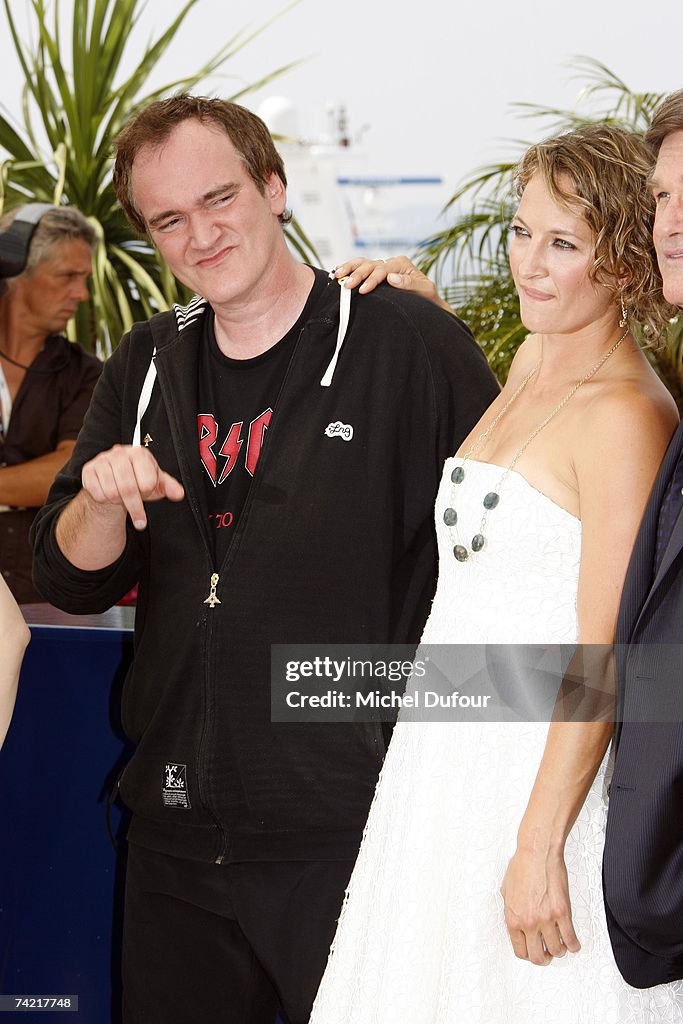Can a film truly be death-proof? Quentin Tarantino's 2007 slasher film, *Death Proof*, presents a chilling answer, plunging viewers into a world where a stuntman's twisted obsession with vehicular murder becomes a terrifying reality.
The film, a unique blend of horror, action, and black comedy, follows the exploits of Kurt Russell as Stuntman Mike, a man who prowls the roads in a heavily modified car, preying on unsuspecting young women. The premise, as unsettling as it is, serves as the foundation for Tarantino's signature style – a carefully crafted narrative laced with sharp dialogue, unexpected violence, and a deep appreciation for the cinematic history of exploitation films. The film's title itself is a darkly ironic statement, suggesting an immunity to death that is, of course, a brutal deception.
The film's cast, a compelling ensemble, features a mix of established talent and rising stars, each bringing a distinct energy to their roles. Rosario Dawson, Vanessa Ferlito, Jordan Ladd, Rose McGowan, Sydney Tamiia Poitier, Tracie Thoms, Mary Elizabeth Winstead, and Zoë Bell, all contribute to the film's complex dynamics. Their characters become the targets of Stuntman Mike's deadly game, their lives intertwined with his in a series of escalating confrontations. The suspense builds as the audience anticipates his next move, a constant reminder of the lurking danger.
Jordan Ladd, a prominent figure in the horror genre, takes on the role of Shanna Bannana, a character crucial to the film’s narrative. Shanna, a friend of Julia and Arlene, celebrates the birthday of the former at Guerro's and the Texas Chili Parlor. She envisions a fun girls' night at her father's Lake L.B.J. vacation home, a stark contrast to the violence that awaits.
Here is a breakdown of Jordan Ladd's career and personal life:
| Category | Details |
|---|---|
| Full Name | Jordan Elizabeth Ladd |
| Born | April 11, 1975 (age 49) |
| Birthplace | Los Angeles, California, U.S. |
| Nationality | American |
| Occupation | Actress |
| Known For | Horror film appearances, notably *Cabin Fever*, *Club Dread*, and *Death Proof*; also known for *Grace*. |
| Marital Status | Divorced (from Conor O'Neill, a documentary film editor) |
| Education | Was a student at University of Southern California |
| Notable Roles | Shanna in *Death Proof*; also starred in *Cabin Fever*, *Club Dread*, and *Grace*. |
| Film Debut | *The Girl Who Came Late* (1991) |
| Net Worth (estimated) | $500,000 to $1 million |
| Years Active | 1987–present |
For additional details, you can refer to: IMDb.
The meticulous details of the film, from the cars themselves to the characters’ interactions, make *Death Proof* a compelling cinematic experience. Stuntman Mike's death-proof car, the central instrument of his depraved acts, becomes a character in itself, its modifications and menacing presence amplifying the tension.
Tarantino’s filmography consistently showcases a reverence for the past, and *Death Proof* is no exception. The film functions as a tribute to the grindhouse cinema of the 1970s, embracing its aesthetic, its gritty realism, and its often-violent themes. The film’s structure, reminiscent of a double feature, adds to this effect, providing a sense of nostalgia for a bygone era of filmmaking.
The narrative unfolds in two distinct parts, each centered on a group of women who become the targets of Stuntman Mike's lethal pursuit. The first segment, set in Austin, Texas, introduces us to the vibrant group of friends. Their interactions, filled with witty banter and playful camaraderie, provide a sharp contrast to the impending danger. Their lighthearted conversations, punctuated by drinks and laughter, create a sense of impending doom, as the audience knows their joy will be disrupted by violence.
The second segment of the film shifts focus to another group of women, this time skilled stuntwomen. Their resourcefulness and determination provide a thrilling counterpoint to Stuntman Mike's brutality. These women are not simply victims; they are fighters, capable of turning the tables on their pursuer. This section is an exploration of survival, resilience, and female empowerment.
The film's impact on popular culture extends beyond its immediate success. *Death Proof*, while perhaps not achieving the same widespread acclaim as some of Tarantino's other works, remains a cult favorite among fans of the director and of genre cinema. The film’s influence can be seen in subsequent films, particularly in its unique blend of action, suspense, and dark humor.
The casting choices, especially the women in *Death Proof*, are a testament to Tarantino's ability to elevate his work. The selection of actresses such as Rosario Dawson, Vanessa Ferlito, Rose McGowan, Sydney Tamiia Poitier, Tracie Thoms, Mary Elizabeth Winstead, and Zoë Bell contributed to the film's popularity and impact. Each actress brings a distinctive presence to her role, enriching the film’s narrative. The film's appeal lies in the performances, the script, and the direction.
The film’s violence, though graphic, is not gratuitous; it serves to emphasize the stakes and the danger faced by the characters. The careful choreography of the action sequences, a hallmark of Tarantino's style, keeps the audience engaged, creating a constant feeling of tension and unease. This contributes to the film's overall effectiveness, making it a genuinely unsettling viewing experience.
The modified cars, the centerpiece of Stuntman Mike's depravity, are given a significant degree of character and are central to the narrative. The roaring engines, the screeching tires, and the visual power of the vehicles intensify the film's sense of menace. The death-proof aspect, of course, is a cruel joke, highlighting the stuntman's distorted worldview.
*Death Proof* explores themes of gender, power, and revenge, offering a complex portrait of its characters and their relationships. The film pushes the boundaries of genre, challenging viewers to confront unsettling realities while also celebrating the vitality of cinematic storytelling. The film serves as a complex interplay of narrative structures.
The film's dedication to the style of grindhouse cinema provides a layer of meaning beyond the surface level of the narrative. Tarantino’s film work consistently references the history of cinema, and *Death Proof* is no exception. The film's visual aesthetic, its pacing, and its use of music all pay homage to the movies of the 1970s, making *Death Proof* a cinephile's delight.
The film provides an entertaining experience, as the film seamlessly transitions from moments of humor to shocking displays of violence, and is indicative of Tarantino's skills as a filmmaker. The dialogue is razor-sharp, the performances are excellent, and the action is expertly choreographed. All of these factors combine to create a truly memorable cinematic experience.



